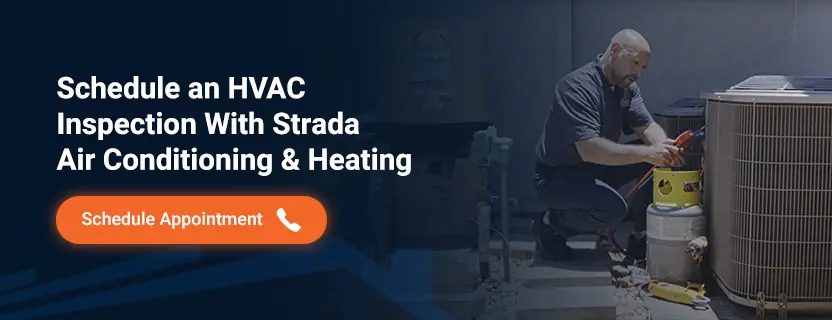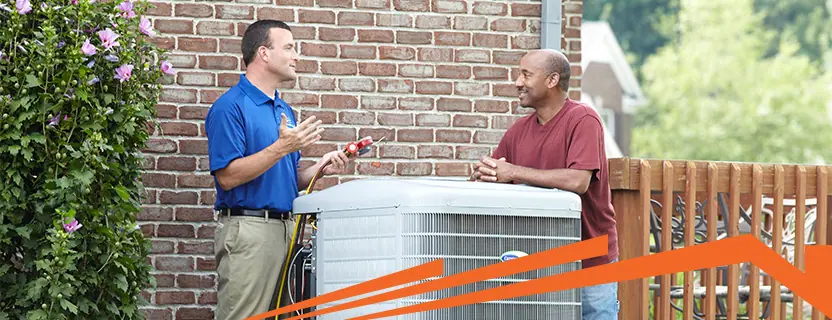
In hot and humid areas like Florida and the Southeast, having a heating, ventilation and air conditioning (HVAC) system is more than a luxury — it’s a nonnegotiable. A reliable HVAC system could be the difference between experiencing refreshing coolness or unbearable heat. Even with milder winters, you may rely on heating to keep your home comfortable as the temperatures drop.
Regular maintenance plays a major role in keeping your heating and cooling system operating as it should. Discover why you need HVAC inspections and the many benefits these checkups offer, from extending the life span of your unit to providing you peace of mind.
Routine checkups are essential as your HVAC system comprises multiple components subjected to a fair amount of stress throughout the year. Understanding these components can highlight the importance of HVAC system inspections — just one faulty part can reduce your unit’s overall efficiency:
Regular inspections allow your technician to spot and address wear and tear issues before they lead to serious breakdowns. For example, clogged filters can significantly slow airflow, making your system work harder and use more energy. Ductwork blockages can interfere with air distribution in your home, causing some rooms to feel warmer or cooler than others. Refrigerant leaks can affect how efficiently the air conditioning component operates, resulting in higher energy usage and potentially damaging the air compressor.
Your technician will carefully inspect your unit, and if they encounter any of these issues, they’ll either fix them immediately or schedule a maintenance appointment — this ensures your HVAC system runs smoothly, allowing you to achieve the perfect indoor temperature year-round.
Beyond creating a comfortable living space for you and your family, there are several other advantages of regular HVAC inspections and maintenance.
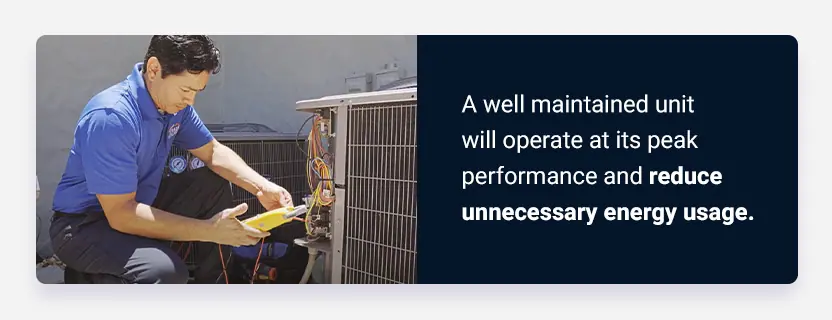
As a Southeast resident, you likely experience a rise in energy consumption and electricity costs during the summer due to the long hours spent cooling your home. Leaks, blockages and other issues can cause your HVAC to work overtime, consuming even more energy than usual and causing utility bills to skyrocket.
One of the main benefits of regular services is the improved efficiency of your HVAC system — a well-maintained unit will operate at its peak performance and reduce unnecessary energy usage. As a result, you’ll enjoy a lower monthly electricity bill.
Along with helping cut down on costs, lowering your energy use can also make your unit more sustainable. Saving energy means fewer harmful emissions. Leaky or poorly insulated ducts can waste a lot of energy, so servicing your HVAC to fix such issues can help shrink your carbon footprint.
Since your HVAC system was likely a significant investment, it makes sense that you’d want it to last and keep your home comfortable as long as possible. While your unit can serve you well for around 10 to 15 years, it depends on how often you service it.
When you miss out on frequent services, your system can be more prone to faults, causing it to wear out quicker and experience more breakdowns. On the other hand, routine inspections and maintenance are vital to extending its life span. While inspecting your unit, your technician will perform the necessary tasks to keep everything running as it should, from securing electrical connections to lubricating moving components.
You can give your equipment a few more good years by being proactive. As a result, you can hold off on replacing your current HVAC for a bit longer, giving you more time to plan and budget for a new system.
In addition to cooling and heating your home, your HVAC promotes better air quality through circulation and filtering out allergens and pollutants. Clean indoor air is crucial for your family’s health and well-being, as exposure to impurities can lead to short-term health effects like headaches and eye irritations and more serious long-term conditions like asthma.
Mold is a harmful contaminant that can negatively impact air quality. This microorganism thrives in damp environments, and the Southeast’s high humidity levels make homes in this region more susceptible to mold growth and risk. A properly functioning HVAC system can control humidity and trap mold spores and other pollutants like dust from being blown into the air as it circulates through your home.
However, a build up of dirt or debris can clog the filter and prevent it from doing its job. In fact, such a blockage can cause your HVAC to retain moisture, leading to the growth of mold, mildew and other bacteria within the unit. Frequent inspections are essential for enhancing indoor air quality, as your technician will ensure your system operates effectively rather than circulating harmful or irritating particles.
Scheduled services can include cleaning or replacing air filters and clearing the ducting. Your technician may also disinfect and deodorize various components to help eliminate odors caused by mold or stagnant water, making your home smell much fresher and more pleasant.
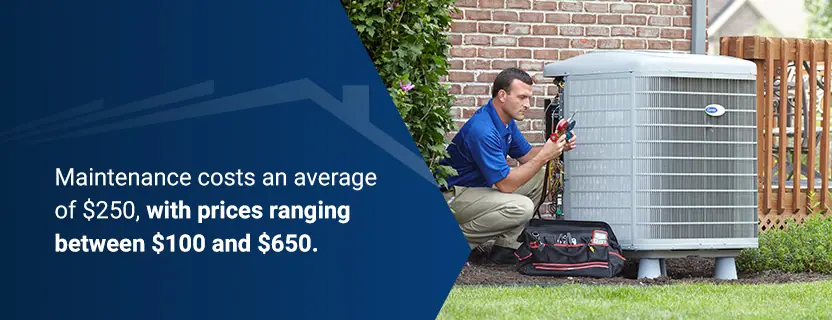
By keeping up with routine inspections and maintenance, your technician will identify and resolve more minor issues before they escalate, allowing you to avoid expensive repairs. They’ll evaluate your system’s overall health, spot worn-out components and offer solutions to fix potential problems.
While HVAC repairs cost $350 on average, the price can vary from $100 to $3,000. In comparison, maintenance costs an average of $250, with prices ranging between $100 and $650. Although services and minor repairs will initially involve a small fee, they can save you a lot of money down the line.
Beyond the repair price, HVAC system failures are inconvenient, leaving you without cooling or heating when needed. Although emergency service calls are an option, your technician could charge an extra $40 to $80 an hour as this type of work typically takes place outside their usual operating hours. Yet, with regular checkups, you can detect and prevent system failures before they occur.
A faulty HVAC system can create safety concerns. For example, HVAC-related electrical hazards can cause a catastrophic event. As your unit ages, its electrical wiring may loosen and result in an uneven distribution in the heating component — an overloaded furnace can overheat the electrical wires and potentially ignite. Gas or refrigerant leaks are other risks. Refrigerants are both toxic and flammable, and so is carbon monoxide (CO), a gas in your unit’s furnace.
With frequent inspections and maintenance, your technician can quickly catch such risks and take corrective action. They’ll check your system’s electrical parts, ensuring they meet industry standards. They’ll also handle any leaks, cracks or dents that could endanger you by allowing CO to seep into your home. Knowing that a professional has meticulously inspected your system can offer the peace of mind that your family’s safety and well-being are protected.
You can also take comfort in knowing you comply with HVAC regulations and codes. Regulatory bodies have established these guidelines to ensure that systems are correctly installed, safely operated and well maintained.
HVAC regulations cover a wide range of factors relating to your unit, from size to energy efficiency. For example, newly installed systems in southern states must have a Seasonal Energy Efficiency Ratio (SEER) of 15 or higher. Other areas of regulation include air quality, ventilation and safety. Performing inspections and any necessary repairs can help ensure you uphold these guidelines. Along with assessing your system’s control and any risks, your technician will confirm your system’s energy efficiency.
Schedule an HVAC inspection at least twice a year to ensure optimal performance. As summer brings rising temperatures and puts extra pressure on your AC component, you should schedule a checkup toward the spring to ensure your unit is ready to handle the hot and humid days ahead. Your technician will test your system’s cooling performance and check the fan blades so that they can clear any dirt or debris buildup.
Book another inspection in the fall to prepare for winter, even with milder temperatures. Once again, your technician will remove debris, such as fallen leaves. They’ll also perform tasks such as sealing ductwork to help you save energy and prevent heat loss, as well as inspecting your furnace for signs of wear and tear.
However, depending on how old your system is, how much you use it and the climate where you live, you may need to schedule appointments more regularly. For example, Florida is one of the most humid states, so homeowners in this area may need more frequent inspections than those in Tennessee.
Call a professional if you notice anything unusual with your unit. Watch out for these signs to determine when you should get your HVAC inspected:
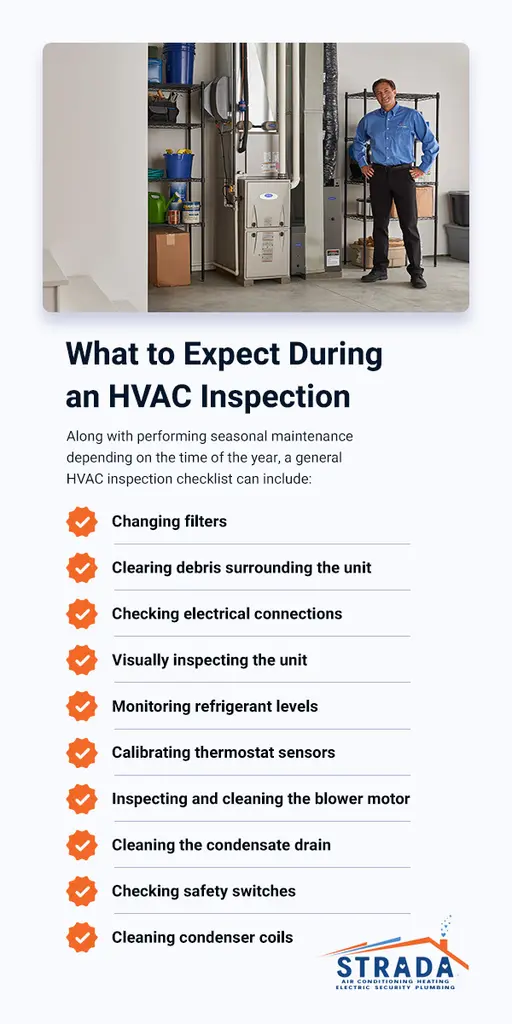
When you schedule an HVAC inspection, expect your technician to evaluate your entire system thoroughly. They’ll take their time to ensure that your AC, heating component and ductwork are working effectively.
Along with performing seasonal maintenance depending on the time of the year, a general HVAC inspection checklist can include:
For any issues your technician cannot repair during their inspection, they’ll schedule another appointment to ensure your system operates at its prime.
If it is time to inspect your HVAC, trust the professionals at Strada Air Conditioning & Heating. Our experienced and hardworking technicians will ensure your HVAC operates at its peak, helping you save money, stay compliant, and provide a safer and more comfortable environment for your family.
Whether you need general or seasonal maintenance, repairs of heat pumps and air conditioners, or a new installation, we offer a wide variety of HVAC services for your home.
If you’re a homeowner in Florida or surrounding areas, prioritize your HVAC maintenance and schedule an inspection with Strada Air Conditioning & Heating today!
